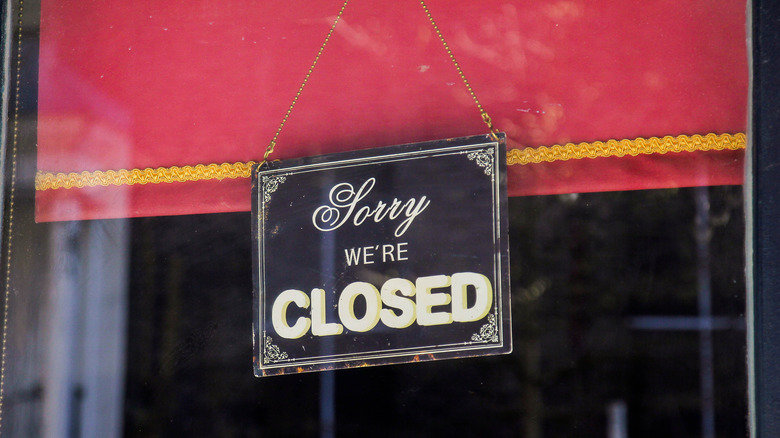Why A Michelin Star Is The Beginning Of The End For Many Restaurants
Many restaurants around the globe work diligently to earn even one Michelin star. This award, one of the most highly regarded and difficult to earn in the world of food-related honors, comes with prestige and displays the phenomenal preparation of a restaurant's dishes. The Michelin Guide states that its five criteria include quality, harmony, mastery, personality, and consistency, often taking multiple meals for the judges to reach their final decision. Arguably the most widely known chef in the world, Gordon Ramsay, has earned 17 Michelin stars over the course of his career. However, receiving an abundance of Michelin stars doesn't always have a happy ending.
Those with Michelin stars are actually more likely to go out of business, according to a study done by University College London (UCL). As for why? As the study noted, the awarding of a Michelin star has been known to result in increased costs, including salary demands from employees, landlords taking advantage of the accolade by raising rent, and suppliers requesting more for supplies.
While plenty of excitement comes after receiving one — or even three — stars, it can quickly be replaced by a feeling of dread and stress in order to keep up with the prestige of the restaurant's new ranking. Unfortunately, this is not a unique experience, as many restaurants have succumbed to the pressure that comes after receiving such a high honor.
Restaurants that closed after receiving a Michelin star
Deanes EIPIC, a restaurant in Northern Ireland, closed after 26 years of business because of its high and unrealistic costs. EIPIC won a Michelin star in 1997 and, while it considered itself a "fine dining" experience, the small population of Belfast didn't have the amount of hungry, wealthy prospective eaters to keep the restaurant afloat. Chef Tom Brown was also forced to close his London restaurant Cornerstone, which opened in 2018 and earned a Michelin star in 2019. Brown, along with a multitude of other high-profile restaurants in the United Kingdom, cited the general state of the industry as the downfall of their restaurants; however, the added stress of the COVID-19 pandemic and high costs intensified the need to close various restaurants.
However, receiving a Michelin star doesn't necessarily mean the end. Plenty of restaurants throughout the world have flourished after boasting such a highly prestigious award. Chef Shaun Rankin, who received a Michelin star for his restaurant Ormer just four months after its launch, told The Staff Canteen that in order to keep your business booming, "You need to be really careful regarding your business model and your market. You can have a star, amazing, but if you've got an empty restaurant you're not going to be successful in business then you're going to close."

